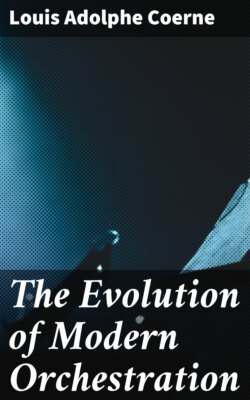Читать книгу The Evolution of Modern Orchestration - Louis Adolphe Coerne - Страница 40
На сайте Литреса книга снята с продажи.
I.
ОглавлениеTable of Contents
Gluck (1714-1787), the third of the great drama reformers, and predecessor of Wagner in the establishment of dramatic continuity, did not appear as the champion of revivified Hellenic ideals until advanced in years. Though he had long harbored an intense antagonism to the paltry conventionalities of the existing lyric drama, his tenets awoke no sympathetic chord in his native land. And thus it came about that the arena of Lulli's scintillating pageantry witnessed the rehabilitation of genuine, legitimate, and unaffected histrionic art. This was attained by a return to a severe and truthful mode of musical declamation, by clothing the several stage characters with distinctive individuality, and by instilling into his music-dramas in their entirety, reflection, simplicity, sincerity, pathos, nobility. The chorus was raised to importance, the function of accompaniment rendered more virile, and the orchestra was made to enhance the dramatic situations. Three defects are noticeable. Gluck made no attempt to break down the barriers of stereotyped operatic forms, his melody is at times stilted, and his music is guilty of frequent grammatical errors. Despite these facts, his choruses are worthy examples of dramatic effect, and the formal structure of his overtures is more rounded than those of even Bach or Händel. But it cannot be said that his genius was conspicuously original; he was essentially a reformer, not an innovator. For as Mr. Edward Dickinson expresses it in general terms: "Gluck's success was not due to his melodic invention or mastery of musical science, for in neither of these particulars can he be ranked among the greatest composers. His ability consisted rather of producing great effects with simple means; the severe grandeur of his style was especially suited to the antique subjects which he chose, and this style was in conformity to the peculiar genius of Greek tragedy."
To independent orchestration Gluck contributed but little, but, considering the age in which he lived, none have excelled him as an interpreter, by means of the orchestra, of pathetic expression, or in the use of appropriate instrumentation, varied and rich tone-coloring. To quote from Parry's "The Art of Music," page 220: "Moreover, the expressive qualities of his admirable recitatives are very much enhanced by his way of dealing with the accompaniment. He neglected no opportunity to make use of the qualities of his orchestral instruments—as far as in him lay—to enforce and accentuate the situations, and even to intensify the passing moment of feeling implied by the dialogue. Composers were successfully developing the sense of the functions and resources of instrumentation. Even Gluck's rival, Piccini, made some very appropriate effects by using his instruments consistently with the spirit of the situations. But Gluck applied himself to the matter with far more intensity, and far more genuine perception of the characters of the instruments. Indeed it would be hardly an exaggeration to say, that he was the first composer in the world who had any genuine understanding of this very modern phase of the art. Mozart was the first to show real natural gift and genuine feeling for beautiful disposition of tone, but Gluck anticipated modern procedure in adapting his colors exactly to the mood of the situation. A good deal had been attempted already in a sort of half-hearted and formal manner, but he was the first to seize firmly on the right principles and to carry out his objects with any mastery of resources." On the other hand, "his orchestration has none of the roundness or balance or maturity of Mozart's. It is unequal and uncertain, and requires humoring in performance to make it produce the effect which is intended."
Gluck relied to an excessive degree upon the string band, and his orchestral writing lacked that balance which the contemporary and sequent classicists regarded as the fundamental requirement. Notwithstanding, his instrumentation exhibits many original insignia that are worthy of record. Thus he demonstrated the dramatic power of low-written viola parts, made varied and characteristic use of the tremolo, was the first to introduce mutes into the orchestra in his "Armide," and caused the trombones to emerge from their hitherto menial subservience, and stand forth in all their dignity and tragic power of portraying peace, sorrow, fear, religion, majesty. And by proving the superior effectiveness in employing a group of three trombones, he established a precedent that has been endorsed by all subsequent composers.
But it must be confessed that in turning over page after page of his scores, one discovers the fact that in deploying his wood-wind Gluck usually laid but modest demands upon them. Their duties were more commonly restricted to the lending of comparatively simple tone-color for heightening dramatic action, or for relieving the monotony of prolonged use of strings alone. Of weird and tragic effect is his concentration of all high wood-wind unisono. But many of his other orchestral characteristics bear the impress of conventionalism then in vogue, which soon becomes monotonous; and his manner of writing for the deeper instruments causes much of his orchestration to sound heavy.
All things considered, the same must be said of Gluck as of his vancourier, Lulli, and of the great oratorio composers, Carissimi and Händel—neither he nor they were attracted by the kaleidoscopic potentiality of the orchestra when isolated from its kindred rivals, the opera and the oratorio. And although his name is to be revered for having opened up the resources of the orchestra, the attention he bestowed upon it was but a reflection of the greater glories that he offered up to the shrine of dramatic lustration.
